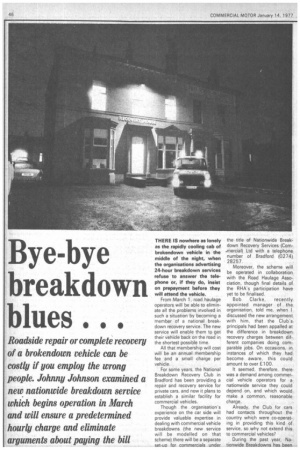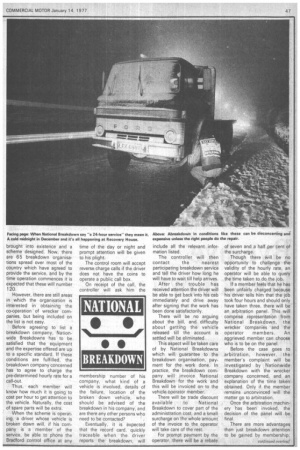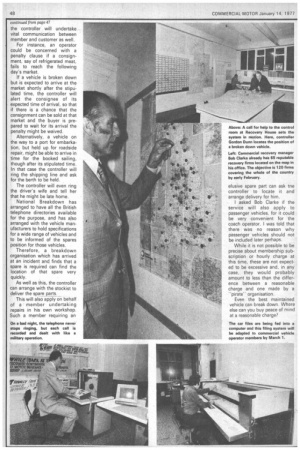Bye-bye breakdown blues . .
Page 48

Page 49

Page 50

If you've noticed an error in this article please click here to report it so we can fix it.
THERE IS nowhere as lonely as the rapidly cooling cab of brokendown vehicle in the middle of the night, when the organisations advertising 24-hour breakdown services refuse to answer the telephone or, if they do, insist on prepayment before they will attend the vehicle.
From March 1, road haulage operators will be able to eliminate all the problems involved in such a situation by becoming a member of a national breakdown recovery service. The new service will enable them to get their vehicle back on the road in the shortest possible time.
All that membership will cost will be an annual membership fee and a small .charge per vehicle.
For some years, the National Breakdown Recovery Club in Bradford has been providing a repair and recovery service for private cars, and now it plans to establish a similar facility for commercial vehicles.
Though the organisation's experience on the car side will provide valuable expertise in dealing with commercial vehicle breakdowns (the new service will be modelled on that scheme) there will be a separate set-up for commercials under the title of Nationwide Breakdown Recovery Services (Corn..mercial) Ltd with a telephone number of Bradford (0274) 28257.
Moreover, the scheme will be operated in collaboration with the Road Haulage Association, though final details of the RHA's participation have yet to be finalised.
Bob Clarke, recently appointed manager of the organisation, told me, when I discussed the new arrangement with him, that the Club's principals had been appalled at the difference in breakdown recovery charges between different companies doing comparable jobs. On occasions, in instances of which they had become aware, this could amount to over £100.
It seemed, therefore, there was a demand among commercial vehicle operators for a nationwide service they could depend on, and which would make a common, reasonable charge.
Already, the Club for cars had contacts throughout the country which were co-operating in providing this kind of service, so why not extend this to commercial vehicles?
During the past year, Nationwide Breakdowns has been brought into existence and a scheme designed. Now, there are 65 breakdown organisations spread over most of the country which have agreed to provide the service, and by the time operation commences it is expected that these will number 120.
However, there are still areas in which the organisation is interested in obtaining the co-operation of wrecker companies, but being included on the list is not easy.
Before agreeing to list a breakdown company, Nationwide Breakdowns has to be satisfied that the equipment and the expertise offered are up to a specific standard. If these conditions are fulfilled, the breakdown company concerned has to agree to charge the pre-determined hourly rate for a call-out.
Thus. each member will know how much it is going to cost per hour to get attention to the vehicle. Naturally, the cost of spare parts will be extra.
When the scheme is operating, a driver whose vehicle is broken down will, if his company is a member of the service, be able to phone the Bradford control office at any time of the day or night and prompt attention will be given to his plight.
The control room will accept reverse charge calls if the driver does not have the coins to operate a public call box.
On receipt of the call, the controller will ask him the membership number of his company, what kind of a vehicle is involved, details of the failure, location of the broken down vehicle, who should be advised of the breakdown in his company, and are there any other persons who need to be contacted?
Eventually, it is expected that the record card, quickly traceable when the driver reports the breakdown, will include all the relevant information listed.
The controller will then contact the nearest participating breakdown service and tell the driver how long he will have to wait till help arrives.
After the trouble has received attention the driver will be able to get back into his cab immediately and drive away after signing that the work has been done satisfactorily.
There will be no arguing about the bill, and difficulty about getting the vehicle released till the account is settled will be eliminated.
This aspect will be taken care of by National Breakdowns which will guarantee to the breakdown organisation, payment for the work done. In practice, the breakdown company will invoice National Breakdown for the work and this will be invoiced on to the vehicle operator member.
There will be trade discount available to National Breakdown to cover part of the administration cost, and a small surcharge on the whole amount of the invoice to the operator will take care of the rest.
For prompt payment by the operator, there will be a rebate of seven and a half per cent of the surcharge.
Though there will be no opportunity to challenge the validity of the hourly rate, an operator will be able to query the time taken to do the job.
If a member feels that he has been unfairly charged because his driver tells him that the job took four hours and should only have taken three, there will be an arbitration panel. This will comprise representation from National Breakdown, the wrecker companies and the operator members. An aggrieved member can choose who is to be on the panel.
Before the case goes to arbitration, however, the member's complaint will be investigated by Nationwide Breakdown with the wrecker company concerned, and an explanation of the time taken obtained. Only if the member remains unconvinced will the matter go to arbitration.
Once the arbitration machinery has been invoked, the decision of the panel will be final.
There are more advantages than just breakdown attention to be gained by membership; the controller will undertake vital communication between member and customer as well.
For instance, an operator could be concerned with a penalty clause if a consignment, say of refrigerated meat, fails to reach the following day's market.
If a vehicle is broken down but is expected to arrive at the market shortly after the stipulated time, the controller will alert the consignee of its expected time of arrival, so that if there is a chance that the consignment can be sold at that market and the buyer is prepared to wait for its arrival the penalty might be waived.
Alternatively, a vehicle on the way to a port for embarkation, but held up for roadside repair, might be able to arrive in time for the booked sailing, though after its stipulated time. In that case the controller will ring the shipping line and ask for the berth to be held.
The controller will even ring the driver's wife and tell her that he might be late home.
National Breakdown has arranged to have all the British telephone directories available for the purpose, and has also arranged with the vehicle manufacturers to hold specifications for a wide range of vehicles and to be informed of the spares position for those vehicles.
Therefore, a breakdown organisation which has arrived at an incident and finds that a spare is required can find the location of that spare very quickly.
As well as this, the controller can arrange with the stockist to deliver the spare parts.
This will also apply on behalf of a member undertaking repairs in his own workshop. Such a member requiring an
'On a bad night, the telephone never stops ringing, but each call is recorded and dealt with like a military operation. Above: A call for help to the control room at Recovery House sets the system in motion. Here, controller Gordon Dunn locates the position of a broken down vehicle.
Left: Commercial recovery manager Bob Clarke already has 65 reputable recovery firms located on the map in his office. The objective is 120 firms covering the whole of the country by early February.
elusive spare part can ask me controller to locate it and arrange delivery for him.
I asked Bob Clarke if the service will also apply to passenger vehicles, for it could be very convenient for the coach operator. I was told that there was no reason why passenger vehicles should not be included later perhaps
While it is not possible to be precise about membership subscription or hourly charge at 'this time, these are not expected to be excessive and, in any case, they would probably amount to less than the difference between a reasonable charge and one made by a -pirate"' organisation.
Even the best maintained vehicle can break down. Where else can you buy peace of mind at a reasonable charge?








































































































